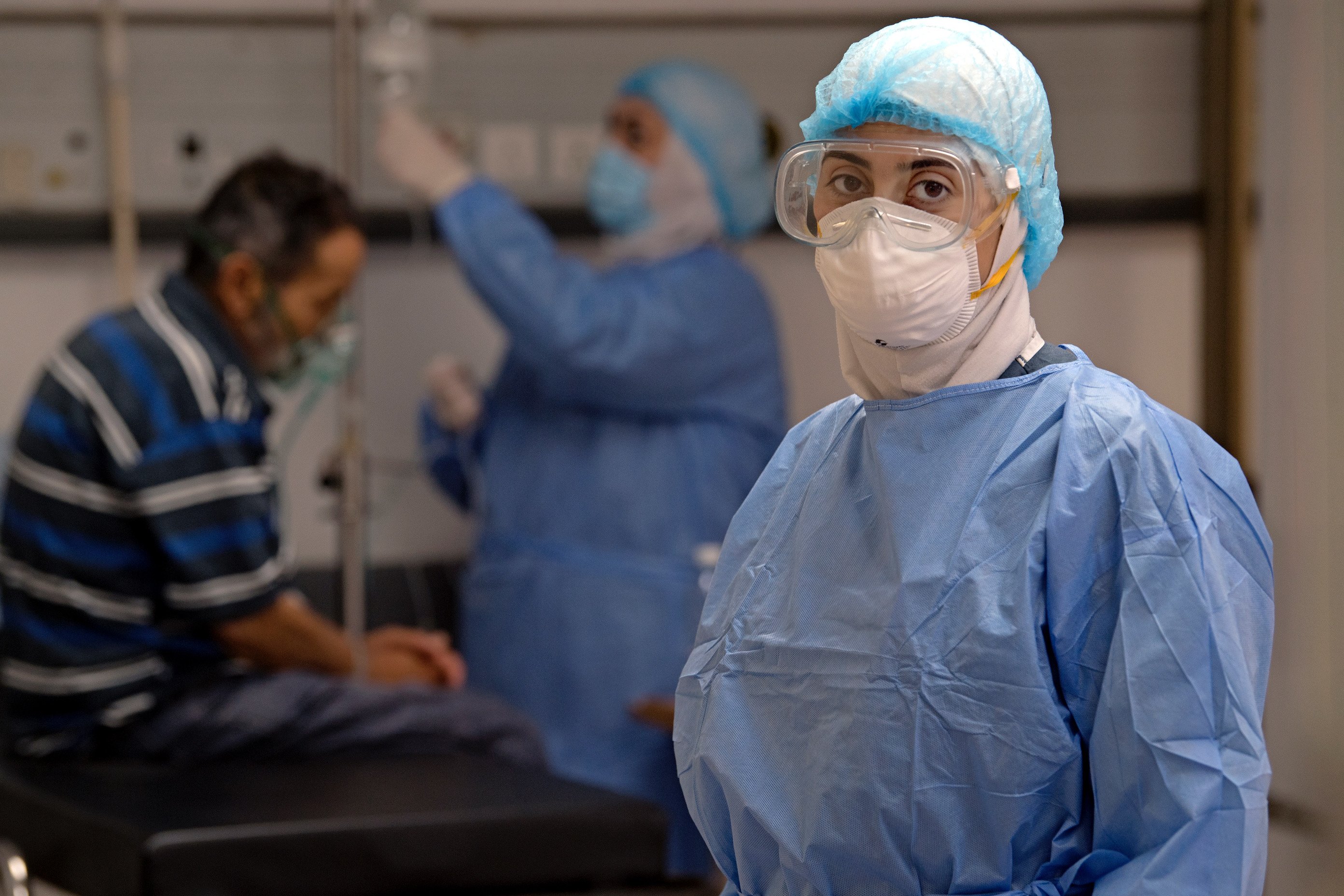
A nurse at Rafic Hariri public hospital. (Credit: Mohammad Yassine/L'Orient-Le Jour)
Amid the bleakest days of the Covid-19 pandemic, the public lauded Lebanon’s nurses for their heroic efforts. Then their unwavering commitment to saving lives in the aftermath of the 2020 Beirut port explosion also earned them a wave of recognition.
Today, however, the country’s nursing community is in shock.
Despite toiling tirelessly to serve patients, their salaries have been reduced to a mere pittance following the collapse of the national currency, which reached LL100,000 to the dollar on Monday.
Mireille A., director of care at Bhannes Hospital in Mount Lebanon, raised an important question: What remains of this recognition today?
“Sadly, not much,” she said.
The nursing community has experienced a mass exodus of professionals who have turned to other professions or sought employment in North America, Europe, or other Arab countries.
The situation is dire, according to Rima Sassine Kazan, the president of the Lebanese Order of Nurses.
“More than 3,500 nurses have left the profession, and more than 55 percent of those who are still working, primarily the younger generation, hope to leave their jobs and the country within the next two years,” Kazan told L’Orient-Le Jour.
She added that an internal migration trend has emerged, with nurses flocking to major university hospitals that offer more attractive salaries.
Speaking at the institution’s 20th-anniversary event in early March, Kazan did not have cause for celebration. Instead, she sounded the alarm.
“Some 3,500 departures, out of an approximate number of 18,600 largely-female professionals, of which only 7,000 are members of the Order, is enormous,” she said.
She went on to estimate that “with a current capacity of 6,000 beds, Lebanon’s hospitals require a nursing staff of 20,000 nurses.”
‘I left a profession I love’
The reasons behind these departures are numerous, most of them relating to salary and professional conditions.
Roula, a nurse anesthetist who had worked at the Middle East Institute of Health-University Hospital in Jal al-Dib for 23 years, explained why she left.
“After 23 years of loyal service, I gave up. I left a profession I love because I was financially exhausted after two years of hardship,” said Roula. “I was only paid LL4 million and $50 a month, and overtime was not even included.”
Roula explained that the salary was not enough to compensate for the collapse of the lira or provide a decent living for her children. She said she resorted to transcribing medical reports for fresh dollar pay to make ends meet.
 Nurses were particularly hard-it during the Covid-19 pandemic. (Credit: Mohammad Yassine/L'Orient-Le Jour)
Nurses were particularly hard-it during the Covid-19 pandemic. (Credit: Mohammad Yassine/L'Orient-Le Jour)
With few exceptions, salaries in the nursing profession have not kept up with the rapid depreciation of the lira.
“About 55 percent of nurses still earn less than the minimum wage, which is capped at LL4,500,000,” explained Kazan. “Additionally, only 20 percent of the country’s hospitals — mainly large university hospitals — pay their nurses a portion of their salary in dollars, ranging from 10 to 50 percent of the basic salary depending on the hospital.”
Pascale, a 36-year veteran nurse of Hôtel-Dieu de France, said an experienced nurse earned around $2,000 a month before the crisis.
“But with the lira depreciation, it is difficult to make ends meet, despite salary adjustments, transportation allowances, compensation in fresh dollars, extra months, and health coverage,” Pascale added.
The public sector’s descent
The situation for nurses in the public sector is akin to a descent into hell. Their salaries have tripled but are not accompanied by compensation in fresh dollars. As the local currency continues to plummet, the value of these salaries continues to decline, leaving nurses in total destitution.
“We are paid like civil servants. Our monthly salary multiplied by three plus daily transport allowances barely reaches LL7 million,” said Najat*, a nurse at a public hospital in Saida, to L’Orient-Le Jour.
“What is even more revolting is that salaries are not consistently paid at the end of the month,” she added. “We have just received half a salary with a delay of several months because the hospital did not have enough funds.”
Najat, who is also a mother, said her living conditions have become intolerable and that her family was forced to leave the apartment they were renting in the heart of Saida and return to their home in the Palestinian camp of Ain al-Hilweh.
“We had left the camp for security reasons. We no longer have the luxury of choice, the income of my husband, a construction worker, has drastically decreased, too,” added Najat.
Nurses share their stories of hardship, but their voices seem to go unheard. There is no hope for a better future.
Ahmad*, a nurse with 20 years of experience in renal dialysis at a public hospital, said that his salary does not even amount to $100.
As a family man with four children, including a disabled daughter, he has no extra income and has to rely on help from relatives to make ends meet.
“I am LL60 million in debt and feel like I am choking,” he said.
Source of stress and exhaustion
Nursing is a physically and emotionally demanding job that often leaves nurses fatigued and exhausted.
“The profession is a source of stress and depression, given the physical and emotional overload that comes with the job,” Kazan said.
“I’m constantly on call," said Ahmad. “I’m 41 years old and my legs are full of varicose veins because I’m on my feet a lot and carrying heavy equipment due to the shortage of staff.”
The situation has created a vicious cycle, as the initial massive departures lead to more defections.
As a result, the remaining nurses — especially the older and more experienced ones — have to shoulder additional work and responsibilities, according to Pascale.
“We have 2,500 new graduates every year from the country’s 23 nursing faculties and institutes. While they may be enthusiastic, they lack practical experience because their training was conducted at a distance during the pandemic,” said Kazan.
The emigration of Lebanese nurses has been ongoing for decades.
As early as 2001, L’Orient-Le Jour reported on why Lebanese nurses, particularly those trained at St. Joseph University, were leaving for France.
Joseph Ghanem chose Canada as his new home in 2017 due to the “ridiculously low salaries and the lack of respect for the profession.”
He explained that it was already challenging to make a decent living as a nurse and a father in Lebanon at that time.
Despite the challenges and difficulties, there are still some nurses who choose to remain in Lebanon. Some have stayed out of their love for the job while others fear the unknown or loss of the benefits they have accumulated, such as reasonable work hours and health coverage.
For Pascale and Najat, their “feeling of belonging” to their institutions and patients is what keeps them going. Leaving everything behind for an extra $50 or $100 is not an easy decision to make, they said.
Ahmad also chooses to stay in the country and help his patients, even though his salary is barely enough to support his family.
“To leave, to go where? I refuse to leave my patients for a few extra dollars,” he said.
Despite feeling out of breath, he considers himself a volunteer until the economic crisis is resolved.
This article was originally published in French in L'Orient-Le Jour. Translation by Sahar Ghoussoub.